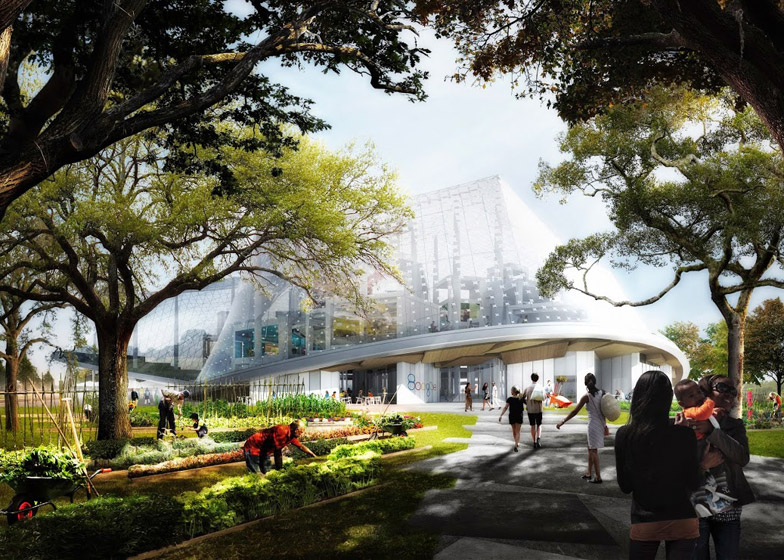Google has found another way to begin construction on its vast Silicon Valley campus designed by BIG and Heatherwick Studio – despite losing its original land bid to social network LinkedIn.
The future of Google's proposed California headquarters was thrown into jeopardy last month when the business was allotted just a quarter of the land required to build it. But the web giant has now presented plans for a similar building on an entirely different site.
The 18.6-acre (7.5 hectare) site is located just east of the company's current headquarters, known as the Googleplex, on the opposite side of Charleston Park in Mountain View.
Google has leased the Charleston East site since 2007 but hasn't moved forward with any plans there until now – despite having permission to build 595,000 square feet (55,000 square metres) of office and commercial space.
Like the designs tabled earlier this year by Danish architecture firm BIG and London-based Heatherwick Studio, the new building proposed by Google will eventually become part of a network of flexible structures and spaces sheltered beneath translucent canopies.
A spokesperson from Heatherwick Studio confirmed that the two studios were also responsible for this latest design.
"We can't say very much about the project, other than confirming that yes we are the designers of that submission and are involved with BIG," he told Dezeen.
The two studios – led by architect Bjarke Ingels and designer Thomas Heatherwick – had originally presented designs for a series of sheltered buildings and gardens across four parcels of land. But in a meeting with local councillors in May, Google was allotted just one, covering 48,000 square metres.
Google's head of real estate David Radcliffe had reportedly told councillors the move was "a significant blow".
The lease agreement on the Charleston East site predates the city's strict limits on office expansion. These were brought in after the North Bayshore area started to become a hub for technology companies, including Google, Microsoft and LinkedIn.
Councillor Mike Kasperzak told local paper San Jose Mercury News that the move was "not a surprise" and that the vacant property had been a factor in the council's decision not to give Google too much more land.
"It was always interesting to me that their plans never showed anything there, it just showed a big field," he told the paper.
Google still requires more than one million square feet (93,000 square metres) of space to build a campus of the size originally planned. It recently filed an appeal for councillors to reconsider the smallest of its rejected sites, on the grounds that it will not increase traffic volume.
Google has been based in Mountain View, just outside San Francisco, for the last 15 years. In an interview with Dezeen, Bjarke Ingels said its new campus will set an industry standard for workplace design and help define "Google 2.0".

